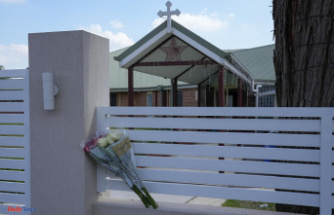Although it is instinctual to flee a burning building, many people with disabilities may find it difficult to do so. After the Grenfell Tower fire recommendations were made for evacuation plans to be created for residents who require extra assistance. So why didn't the government oppose it?
Joe Kimber worries about his block of flats if there is a fire when he goes to sleep at night.
He lives on the third floor in west London with Liz, his partner. He has a complicated brain injury that makes it difficult for him to walk and requires a wheelchair. This begs the question: How would he escape an emergency?
"If there is a fire, there is no plan to get me outside the building." He said that the fear of being cremated alive was horrendous.
Many disabled people living in high-rise apartments are afraid of this because they would not be able to get out on their own. They are advised to stay put and wait for help.
The government rejected a recommendation to make evacuation plans mandatory for building owners - also known as PEEPs – last week.
Joe said, "It's mind-boggling that Joe and I are having a discussion about getting disabled people out from a burning building."
The Grenfell Tower Inquiry's (GTI) first report, which examined the circumstances surrounding the June 2017 fire and found that there were no evacuation plans in place, recommended the introduction of PEEPs.
It discovered that the "stay put" advice, which is based on the idea that it is safer to live in a place where walls, floors and doors contain fire, had failed due to the ACM cladding acting as a fuel source.
It was then that it became clear that "stay put" was not effective and there was no way to rescue people.
Total, 72 people, 15 of them disabled, lost their lives.
Grenfell United summarized the situation by saying, "They had no personal evacuation plan or any means of escape." They were not given a chance."
According to the GTI report, the government should make it a legal requirement for building owners to implement Personal Emergency Evacuation Plans (PEEP).
A PEEP is a plan that a person who cannot move unassisted from a building can use to help them escape. This plan is used frequently by people with mobility problems, cognitive, visual, or hearing impairments.
It's the conversation about which route is safest.
It is important to quickly evacuate rather than wait for the fire department to save you.
Many people with disabilities will be familiarized with PEEPs. They are required in work places and violate the Equality Act 2010. It is also discriminatory.
However, it's not required for residential blocks.
Grenfell's recommendation was then a beacon of hope for many people with disabilities. The inquiry's findings were supported by a follow-up consultation in which 83% of respondents, including building owners, agreed that PEEPs should also be implemented.
Last week, however, the government declared it would "propose delivering against the Grenfell Tower Inquiry and subsequent consultations on PEEPs."
Georgie Hulme co-founder of Claddag, an organisation that fights for mandatory PEEPs says "We are utterly shocked." "Why should we undertake any public inquiry or consultation if the recommendations or results are ignored?"
Georgie, who was diagnosed with a disability as an adult, had a "near miss electrical fire" and said that having no escape from the building was "extremely scary".
"I felt sick. "I felt sick. Is there an evac chair? Would they be able to carry me if there wasn't an evac chair?
"Getting rescued shouldn't be your only choice. People with disabilities shouldn't have to wait while those who don't require any assistance to evacuate the building can get out.
Practicalities were cited by the government as the main obstacle to implementing PEEPs. The government stated that it would be necessary to "staff up" buildings in order to carry out the plan, but this would cost approximately PS21,900 per month.
The report stated that one member of staff would not be able to evacuate all residents with mobility impairments. Another alternative, which relies on neighbours, could cause tension between non-disabled and disabled residents.
The article also stated that attempts to evacuate disabled persons before the fire department arrived could cause delays for non-disabled people trying to escape.
"We are talking about whether someone is going to die for the sake of a few hundred pounds or a conversation," Sarah Rennie (Georgie's cofounder of Claddag), says. "A lot of people with disabilities across the country are very scared."
She said that while it might be a questionable decision for disabled people to live in tower blocks of apartments, they have little choice regarding housing stock and affordability. Some people might choose to live close to their work or within their support networks.
The Home Office decided against the PEEPs plan and launched another consultation to find an "alternative package", Emergency Evacuation Information Sharing, (EEIS).
The fire department would conduct a risk assessment with the building manager. The resident would usually pay for any safety measures, such as handrails.
It would only be applicable to buildings deemed "higher-risk". According to the London Fire Brigade, approximately 1,000 buildings in London are considered higher-risk. This is roughly half of all national buildings. All other buildings will continue to use "stay put".
Sarah states, "This idea is really concerning. The fire department is now responsible. It's not evacuation; it's going be rescue.
She is also concerned about sharing sensitive data.
According to the Home Office last year, it took 7 minutes and 3 seconds for a 999 call to be answered by the first vehicle to arrive at a fire in England.
Sarah adds that her notes may have indicated she has osteoporosis. She needs to be lifted in certain ways. However, the nature of the emergency means that the fire department won't be able consider such details upon arrival. Sarah could also be hurt.
She says, "The fire department in a rescue is honestly not going to care because it's going to try to save my life." This is not feasible and it's unfair to the fire department.
The government has released its updated plan for consultation through August. It says that 21 of 46 GTI recommendations have been incorporated into law so far. This includes setting minimum frequency checks for fire doors.
A spokesperson for the Home Office said that "our fire reforms will be further than ever before in order to protect vulnerable persons."
Campaigners see this as a U turn after Boris Johnson pledged to parliament in 2019, in which he said: "I can guarantee the house and all those affected by the Grenfell disaster that action will follow wherever it is needed."
Listen to the podcast, and get support and information on the Access All page.












